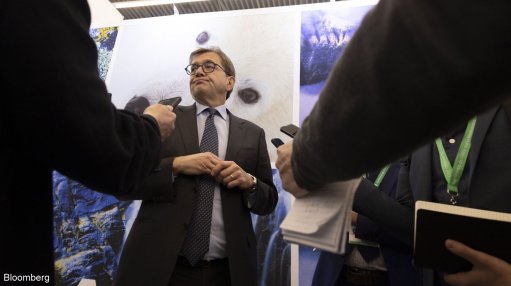
Natural Resources Minister Jonathan Wilkinson
Natural Resources Minister Jonathan Wilkinson used the yearly Prospectors and Developers Association of Canada (PDAC) 2023 convention in Toronto to announce more details of the implementation of the Canadian government’s Critical Minerals Strategy, which was unveiled in December.
The Minister on Tuesday announced an investment of C$344-million to help advance “the development of a dynamic and competitive critical minerals sector”.
The investment will be split among five programmes or initiatives. The Critical Minerals Technology and Innovation Programme will receive C$144.4-million for the research, development, demonstration, commercialisation and adoption of new technologies and processes that support sustainable growth in Canadian critical minerals value chains and associated innovation ecosystems.
The Critical Minerals Geoscience and Data Initiative will receive C$79.2-million to enhance the quality and availability of data and digital technologies to support geoscience and mapping that will accelerate the efficient and effective development of Canadian critical minerals value chains, including by identifying critical minerals reserves and developing pathways for sustainable mineral development.
The Global Partnerships Programme will receive C$70-million to strengthen Canada’s global leadership role in enhancing critical minerals supply chain resiliency through international collaborations related to critical minerals.
The Northern Regulatory Initiative will receive C$40-million to advance Canada’s northern and territorial critical minerals agenda by supporting regulatory dialogue, regional studies, land-use planning, impact assessments and Indigenous consultation.
The renewal of the Critical Minerals Centre of Excellence (CMCE) will receive C$10.6-million so the CMCE can continue the ongoing development and implementation of the Canadian Critical Minerals Strategy.
Wilkinson also announced at the PDAC convention the approval of six projects under the Critical Minerals Research Development and Demonstration (CMRDD) programme, which aims to advance the commercial readiness of emerging processing technologies that will support the development of value chains for zero-emission vehicles in Canada.
These six projects represent a total investment of more than C$14-million and aim to validate the feasibility, viability and replicability of processing technologies by conducting pilot demonstrations.
The funding through the CMRDD program includes C$795 524 for Sherritt International, C$3.55-million for E3 Lithium, C$724 871 for FPX Nickel, C$5-million for Search Minerals, C$3-million for Geomega Resources and C$1.07-million for Prairie Lithium.
The C$14-million investment represents the first wave of the close to C$200-million in innovation funding that the government has committed toward research, development and demonstration.
“Canada will continue to work with partners to establish our country as the global supplier of choice for clean energy in a net-zero world — ensuring a prosperous and clean future for Canadians from coast to coast to coast,” Natural Resources Canada stated.
Alberta-based lithium developer and extraction technology innovator E3 Lithium said it would use the funding to advance the design, construction and operation of its field pilot plant, which was on track to begin operations in the third quarter.
"We are ecstatic to receive funding from Natural Resources Canada to support the work we are doing to produce battery-grade lithium. Receiving support from all levels of government to develop our lithium resource speaks volumes to the importance placed on commercializing critical minerals from Alberta and the progress E3 has made in developing this industry," commented E3 president and CEO Chris Doornbos.
Search Minerals, which focuses on critical rare earth element projects in the emerging Port Hope Simpson – St. Lewis CREE district of south-east Labrador, will use its C$5-million to fund the construction and operation of a demonstration plant for rare earth extraction and recovery. The total project cost is estimated at about C$9.3-million with a further C$1-million of funding under application from other sources. Search Minerals’ contribution to the construction costs is expected to be about C$3.3-million.
The demonstration plant will process about 20 t of rare earth concentrate prepared from 72 t of Deep Fox and Foxtrot mineralisation using wet high intensity magnetic separation. The work will be completed by SGS Canada and completion of the program is expected in early 2024.
“These funds will help us to move toward a bankable feasibility study assessment of rare earth mining, extraction and separation in the province of Newfoundland and Labrador,” said Search chairperson and interim president and CEO Leo Power.
“The demand for 'magnet' rare earth elements such as neodymium, praseodymium, dysprosium and terbium is increasingly rapidly driven by the demand for permanent magnets for electric vehicle traction motors, wind turbines for power generation and for robots. This demonstration plant programme will position Search as a reliable provider of rare earth materials to support a Canadian and North American supply chain for these critical materials.”
Geomega, which is developing alternative technologies for the extraction, refining, and recycling of rare earths and other critical materials, will use its allocation to further work on the construction of the magnet recycling demonstration plant, in Quebec.
“We are very grateful to the federal government for their support. Government’s support in moving the Canadian innovations towards commercialisation is a major advantage in what is becoming a very competitive global field. The need to develop sustainable technologies to recover critical minerals from secondary sources is very real, especially taking into consideration the 2050 net-zero targets. We are proud to be developing this first-of-a-kind facility to recycle permanent magnets here in Canada. This contribution provides us with the needed funding and support to deliver on our major milestones throughout this year as we move forward with the demonstration plant development.” commented Geomega president and CEO Kiril Mugerman.